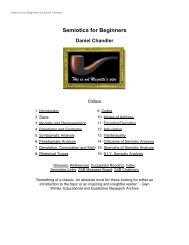Semiotics for Beginners by Daniel Chandler
Semiotics for Beginners by Daniel Chandler
Semiotics for Beginners by Daniel Chandler
Create successful ePaper yourself
Turn your PDF publications into a flip-book with our unique Google optimized e-Paper software.
<strong>Semiotics</strong> <strong>for</strong> <strong>Beginners</strong> <strong>by</strong> <strong>Daniel</strong> <strong>Chandler</strong><br />
A B C D E F G H I J K L M N O P Q R S T U V W X Y Z<br />
• Hegemonic code: See Dominant code<br />
• Hermeneutics: Hermes was the Greek god who delivered and interpreted messages. The term hermeneutics is<br />
often used to refer to the interpretation of texts. Guiraud uses it to refer to a relatively open, loose and often<br />
unconscious system of implicit interpretative practices, in contrast to the more <strong>for</strong>mal and explicit character of a<br />
code. See also: Code, Interpretative codes<br />
• Historicity: Historical context. Insofar as structuralist semiotics tends to focus on synchronic rather than diachronic<br />
analysis, critics have argued that it is ahistorical - that it ignores process and historicity. See also: Diachronic<br />
analysis<br />
• Homology: See Isomorphism<br />
• Horizontal axis: See Combination, axis of<br />
• Humanism: See Essentialism<br />
• Hypostasis: See Reification<br />
A B C D E F G H I J K L M N O P Q R S T U V W X Y Z<br />
• Iconic: A mode in which the signifier is perceived as resembling or imitating the signified (recognizably looking,<br />
sounding, feeling, tasting or smelling like it) - being similar in possessing some of its qualities (e.g. a portrait, a<br />
diagram, a scale-model, onomatopoeia, metaphors, 'realistic' sounds in music, sound effects in radio drama, a<br />
dubbed film soundtrack, imitative gestures) (Peirce). See also: Indexical, Isomorphism, Modes of relationship,<br />
Symbolic<br />
• 'Ideal readers': This is a term often used to refer to the roles in which readers of a text are 'positioned' as subjects<br />
through the use of particular modes of address. For Eco this term is not intended to suggest a 'perfect' reader who<br />
entirely echoes any authorial intention but a 'model reader' whose reading could be justified in terms of the text.<br />
Note that not every reader takes on the reader's role which may have been envisaged <strong>by</strong> the producer(s) of the<br />
text. See also: Addresser and addressee, Modes of address, Preferred reading, Subject<br />
• Idealism (subjectivism): A philosophical (specifically epistemological) stance on 'what is real?' in which, in its<br />
extreme <strong>for</strong>m, it is argued that reality is purely subjective and is constructed in our use of signs. Constructivists<br />
criticize the blindness of idealism to the social dimension. Divorcing texts from their social contexts is sometimes<br />
referred to as 'textual idealism'. Left-wing critics in particular object that idealism ignores the material conditions of<br />
human existence. Idealism is most strongly opposed <strong>by</strong> materialists, who associate it with essentialism because a<br />
notion of humanity as a pre-given essence is based on 'transcendental consciousness' as the source of meaning.<br />
Note that the belief that nothing exists except oneself and one's own mental states is referred to as solipsism. See<br />
also: Constructivism, Epistemology, Essentialism, Materialism, Realism (objectivism), Relativism, epistemological<br />
• Ideological codes: One of the types of interpretative codes, notably, the 'isms', such as: individualism, capitalism,<br />
liberalism, conservatism, feminism, materialism, consumerism and populism. Also includes codes of textual<br />
production and interpretation (dominant, negotiated and oppositional). Note, however, that all codes can be seen<br />
as ideological. See also: Code, Dominant codes, Ideology, Negotiated codes, Oppositional codes<br />
• Ideology: There are no ideologically 'neutral' sign systems: signs function to persuade as well as to refer. Modern<br />
semiotic theory is often allied with a Marxist approach which stresses the role of ideology. Ideology constructs<br />
people as subjects through the operation of codes. According to the theory of textual positioning, understanding<br />
the meaning of a text involves taking on an appropriate ideological identity (see 'Ideal readers'). For Althusser,<br />
ideology was a system of representation involving 'transparent myths' which functioned to induce in the subject an<br />
'imaginary' relation to the 'real' conditions of existence. For those inclined towards realism ideology involves a<br />
'distortion' of an 'objective' 'reality'. Barthes argues that the orders of signification called denotation and<br />
connotation combine to produce ideological myths. Ideological <strong>for</strong>ces seek to naturalize codes - to make<br />
dominant cultural and historical values, attitudes and beliefs seem 'natural', 'self-evident' and 'common-sense',<br />
although the operation of ideology in signifying practices is typically made to appear transparent. Barthes saw<br />
myth as serving the ideological interests of the bourgeoisie. Semiotic analysis involves ideological analysis and<br />
seeks to denaturalize codes. See also: Commonsense, Denaturalization, Ideological codes, Naturalization




